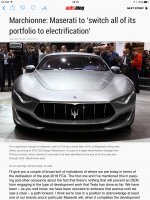Another company owned by Geely, and shares parts with Volvo so not your usual clever but poorly funded British effort.
It seems while tesla are very loud and vocal about the future of electric, geely have some 10 years of electric car research and development, and are finally putting it to good use, sneaking it in slowly and under the radar, that said if this taxi is a success then it may hail a big change in public perception of electric vehicles.


